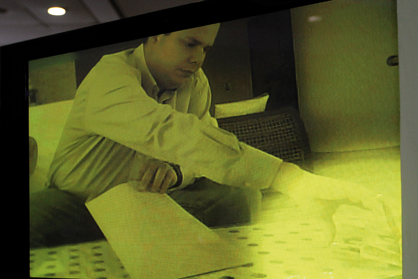
(Venezuelanalysis 15/09712) A video has emerged of a top campaign aide of Venezuelan opposition candidate Henrique Capriles Radonski covertly accepting 40,000 bolivars (US $9,300) and offering to set up a meeting between Capriles and an unknown businessman (video at bottom of post).
 The video has provoked accusations of bribery and corruption among Capriles’ Roundtable of Democratic Unity (MUD) coalition. Capriles immediately sacked the aide, Juan Carlos Caldera, who is a parliamentary deputy for Capriles’ First Justice (PJ) party and was the MUD’s representative to Venezuela’s National Electoral Council.
The video has provoked accusations of bribery and corruption among Capriles’ Roundtable of Democratic Unity (MUD) coalition. Capriles immediately sacked the aide, Juan Carlos Caldera, who is a parliamentary deputy for Capriles’ First Justice (PJ) party and was the MUD’s representative to Venezuela’s National Electoral Council.
The incident comes just three weeks before Capriles and President Hugo Chavez contest the 7 October presidential election vote.
Secret Meeting
The video was played to journalists yesterday in the Venezuelan National Assembly (AN), by legislators of the government’s United Socialist Party of Venezuela (PSUV).
In the first section, Capriles’ aide Caldera is seen meeting with the intermediary of a client referred to as “the boss”, said to be a businessman outside of Venezuela, and accepts a closed envelope from the intermediary. “We want it to be a monthly affair,” adds Caldera.
In the second section, dated 12 June, the intermediary tells Caldera that “the boss” would like to meet with Capriles himself. Caldera says this would be possible to arrange, but only when Capriles is on tour outside the country, hinting that a meeting inside Venezuela would be too risky.
Caldera then accepts bundles of 100 bolivar banks notes from “the boss” and stuffs them into an envelope. “Tell him [the boss] that things are going well, the job isn’t done but we’re on the way to achieving it,” he tells the intermediary.
Accusations
A special commission of the National Assembly (AN) is to be established to investigate the incident, with PSUV politicians accusing MUD leaders of bribery and corruption.
PSUV legislator Julio Chavez, who said he received the video from people “who feel permanently extorted,” argued the video was “overwhelming proof that compromises the acts of some leaders of the Venezuelan opposition”, including in the MUD coalition.
He called Caldera’s conduct “an act of bribery” and suggested that Caldera may have broken Venezuela’s law on political parties, the law against organised crime, and that the money could even be destined for destabilising activities ahead of the presidential election.
The socialist legislator added that questions being posed by the PSUV included, “What is the job that hasn’t been completed? What’s it about? Where are these funds destined to? Who is the “boss” that wants to meet with the candidate [Capriles]?”
Opposition Response
Minutes after the video was shown, Henrique Capriles sacked Caldera from his campaign, announcing to press, “Juan Carlos Caldera is out the project. Not he, nor anyone else, has the right to use my name for personal benefit”.
Capriles further declared he didn’t want “vices of the past” in his political project, and in turn accused the Venezuelan government of undertaking a “dirty war” against his candidacy. “On 7 October the Venezuelan people are going to teach them [the government] a lesson,” he said.
Polls continue to give socialist candidate Hugo Chavez a significant electoral advantage, with the most recent poll by private firm Datanalisis published this week giving Chavez a 13% lead over his rival.
Meanwhile, in a press conference yesterday evening, a shaken Caldera admitted that it was him in the video and that he had accepted 40,000 bolivars, but argued that the money wasn’t a bribe. “I don’t sell myself, nor accept bribes,” he declared.
He claimed the money was from a businessman named Wilmer Ruperti, who has interests in the oil and media industries, and that the payments were to fund Caldera’s own mayoral campaign in April next year. He further insisted that the “job” not yet done referred to a victory for Capriles in the presidential election.
He exonerated Capriles from the affair, saying that his political colleague “has nothing to do” with the money received, and stated his continued political support for Capriles.
Investigation to Proceed
Pro-Chavez politicians have treated the opposition’s statements with scepticism.
PSUV deputy and second vice president to the AN, Blanca Eekhout, argued yesterday that the fact that Capriles fired his campaign aide before any investigation shows “there is a confession [of guilt,]” while saying that Capriles’ candidacy was “falling to pieces”.
Today, the president of the National Assembly, Diosdado Cabello, informed public television channel VTV that the AN would investigate the truth behind the alleged bribery. “We’re going to do all that’s in the assembly’s power, we’ll go all the way [in the investigation],” he said.
The incident is the latest in a number of political setbacks for Capriles’ campaign over the last few weeks, which include the leaking of a MUD policy document that was different to Capriles’ official manifesto, the dismissal of an opposition parliamentarian for criticising an alleged MUD “hidden agenda,” and withdrawal of support for Capriles by four political parties.




